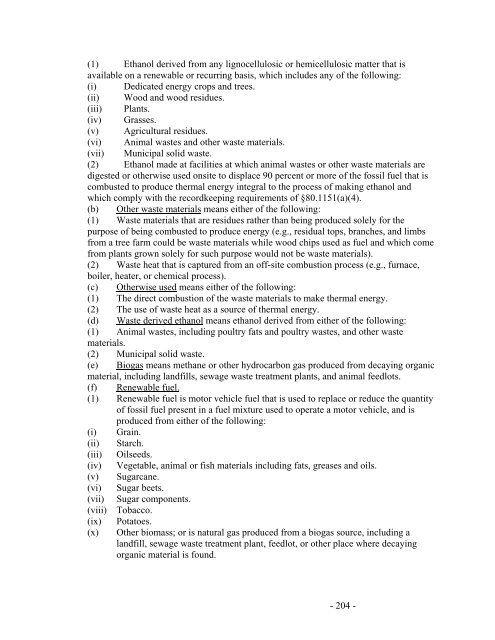Regulation of Fuels and Fuel Additives: Renewable Fuel Standard ...
Regulation of Fuels and Fuel Additives: Renewable Fuel Standard ...
Regulation of Fuels and Fuel Additives: Renewable Fuel Standard ...
Create successful ePaper yourself
Turn your PDF publications into a flip-book with our unique Google optimized e-Paper software.
(1) Ethanol derived from any lignocellulosic or hemicellulosic matter that is<br />
available on a renewable or recurring basis, which includes any <strong>of</strong> the following:<br />
(i) Dedicated energy crops <strong>and</strong> trees.<br />
(ii) Wood <strong>and</strong> wood residues.<br />
(iii) Plants.<br />
(iv) Grasses.<br />
(v) Agricultural residues.<br />
(vi) Animal wastes <strong>and</strong> other waste materials.<br />
(vii) Municipal solid waste.<br />
(2) Ethanol made at facilities at which animal wastes or other waste materials are<br />
digested or otherwise used onsite to displace 90 percent or more <strong>of</strong> the fossil fuel that is<br />
combusted to produce thermal energy integral to the process <strong>of</strong> making ethanol <strong>and</strong><br />
which comply with the recordkeeping requirements <strong>of</strong> §80.1151(a)(4).<br />
(b) Other waste materials means either <strong>of</strong> the following:<br />
(1) Waste materials that are residues rather than being produced solely for the<br />
purpose <strong>of</strong> being combusted to produce energy (e.g., residual tops, branches, <strong>and</strong> limbs<br />
from a tree farm could be waste materials while wood chips used as fuel <strong>and</strong> which come<br />
from plants grown solely for such purpose would not be waste materials).<br />
(2) Waste heat that is captured from an <strong>of</strong>f-site combustion process (e.g., furnace,<br />
boiler, heater, or chemical process).<br />
(c) Otherwise used means either <strong>of</strong> the following:<br />
(1) The direct combustion <strong>of</strong> the waste materials to make thermal energy.<br />
(2) The use <strong>of</strong> waste heat as a source <strong>of</strong> thermal energy.<br />
(d) Waste derived ethanol means ethanol derived from either <strong>of</strong> the following:<br />
(1) Animal wastes, including poultry fats <strong>and</strong> poultry wastes, <strong>and</strong> other waste<br />
materials.<br />
(2) Municipal solid waste.<br />
(e) Biogas means methane or other hydrocarbon gas produced from decaying organic<br />
material, including l<strong>and</strong>fills, sewage waste treatment plants, <strong>and</strong> animal feedlots.<br />
(f) <strong>Renewable</strong> fuel.<br />
(1) <strong>Renewable</strong> fuel is motor vehicle fuel that is used to replace or reduce the quantity<br />
<strong>of</strong> fossil fuel present in a fuel mixture used to operate a motor vehicle, <strong>and</strong> is<br />
produced from either <strong>of</strong> the following:<br />
(i) Grain.<br />
(ii) Starch.<br />
(iii) Oilseeds.<br />
(iv) Vegetable, animal or fish materials including fats, greases <strong>and</strong> oils.<br />
(v) Sugarcane.<br />
(vi) Sugar beets.<br />
(vii) Sugar components.<br />
(viii) Tobacco.<br />
(ix) Potatoes.<br />
(x) Other biomass; or is natural gas produced from a biogas source, including a<br />
l<strong>and</strong>fill, sewage waste treatment plant, feedlot, or other place where decaying<br />
organic material is found.<br />
- 204 -
















